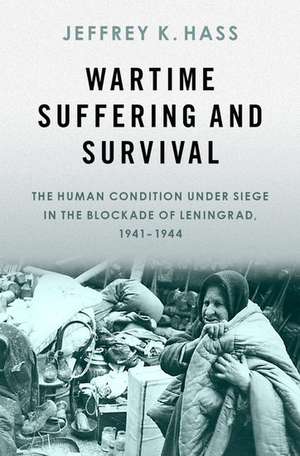Wartime Suffering and Survival: The Human Condition under Siege in the Blockade of Leningrad, 1941-1944
Autor Jeffrey K. Hassen Limba Engleză Hardback – 10 aug 2021
Preț: 287.00 lei
Nou
Puncte Express: 431
Preț estimativ în valută:
54.93€ • 59.69$ • 46.18£
54.93€ • 59.69$ • 46.18£
Carte disponibilă
Livrare economică 19-25 martie
Preluare comenzi: 021 569.72.76
Specificații
ISBN-13: 9780197514276
ISBN-10: 0197514278
Pagini: 440
Ilustrații: 28 b&w halftones
Dimensiuni: 239 x 155 x 38 mm
Greutate: 0.73 kg
Editura: Oxford University Press
Colecția OUP USA
Locul publicării:New York, United States
ISBN-10: 0197514278
Pagini: 440
Ilustrații: 28 b&w halftones
Dimensiuni: 239 x 155 x 38 mm
Greutate: 0.73 kg
Editura: Oxford University Press
Colecția OUP USA
Locul publicării:New York, United States
Recenzii
Just as early biologists who sought to understand the human body's adaptation to heat or cold had to abandon the temperate zones for the deserts and the polar regions, so social scientists must expand the range of environments they study to fathom the adaptive capacity of the human spirit. In this comprehensive study of how citizens—everyday people and those representing the authority of the state—responded to extraordinary privation as Hitler's armies encircled Leningrad, Jeffrey Hass does exactly that. Drawing on detailed accounts from Russian archives, he tells a story of daily life in extremis, vivid and alternately horrifying and inspiring in its details, with profound implications both for social theory and for anticipating human responses to contemporary challenges. A tour de force of moral sociology.
Drawing on personal and state archives, Jeffrey Hass chronicles the efforts of men and women in besieged Leningrad to maintain their humanity even as survival compelled the violation of 'civilized' norms. In Leningraders' dilemmas, he seeks answers to universal questions of how individuals, institutions, and gender and class relations adapt and endure through moments of profound suffering.
Jeffrey Hass, in this beautifully written and bracingly clear book, presents the material, institutional, and moral dilemmas Leningraders faced during the Nazi Blockade in which one million of them died. Readers will gain insights into daily life and the overall dynamics of the Blockade while learning new truths about human behavior, emotion, and thought in extreme situations.
In Wartime Suffering and Survival, Hass masterfully weaves together individual stories with sociological analysis to present a fresh and compelling portrait of the human condition during the siege of Leningrad. Privileging the contemporaneous voices of Leningraders themselves, Hass is sensitive, subtle, and unflinching in revealing the complex, evolving interplay between people and institutions throughout the Blockade. His discussion of compelled and tragic agency—how individuals make unthinkable choices under desperate conditions—will stay with the reader long after the last page has been turned.
Drawing on personal and state archives, Jeffrey Hass chronicles the efforts of men and women in besieged Leningrad to maintain their humanity even as survival compelled the violation of 'civilized' norms. In Leningraders' dilemmas, he seeks answers to universal questions of how individuals, institutions, and gender and class relations adapt and endure through moments of profound suffering.
Jeffrey Hass, in this beautifully written and bracingly clear book, presents the material, institutional, and moral dilemmas Leningraders faced during the Nazi Blockade in which one million of them died. Readers will gain insights into daily life and the overall dynamics of the Blockade while learning new truths about human behavior, emotion, and thought in extreme situations.
In Wartime Suffering and Survival, Hass masterfully weaves together individual stories with sociological analysis to present a fresh and compelling portrait of the human condition during the siege of Leningrad. Privileging the contemporaneous voices of Leningraders themselves, Hass is sensitive, subtle, and unflinching in revealing the complex, evolving interplay between people and institutions throughout the Blockade. His discussion of compelled and tragic agency—how individuals make unthinkable choices under desperate conditions—will stay with the reader long after the last page has been turned.
Notă biografică
Jeffrey K. Hass is currently an associate professor in the Department of Sociology & Anthropology at the University of Richmond and a part-time Professor of Economics in the Faculty of Economics, Department of Economic Theory, at St. Petersburg State University in Russia.
